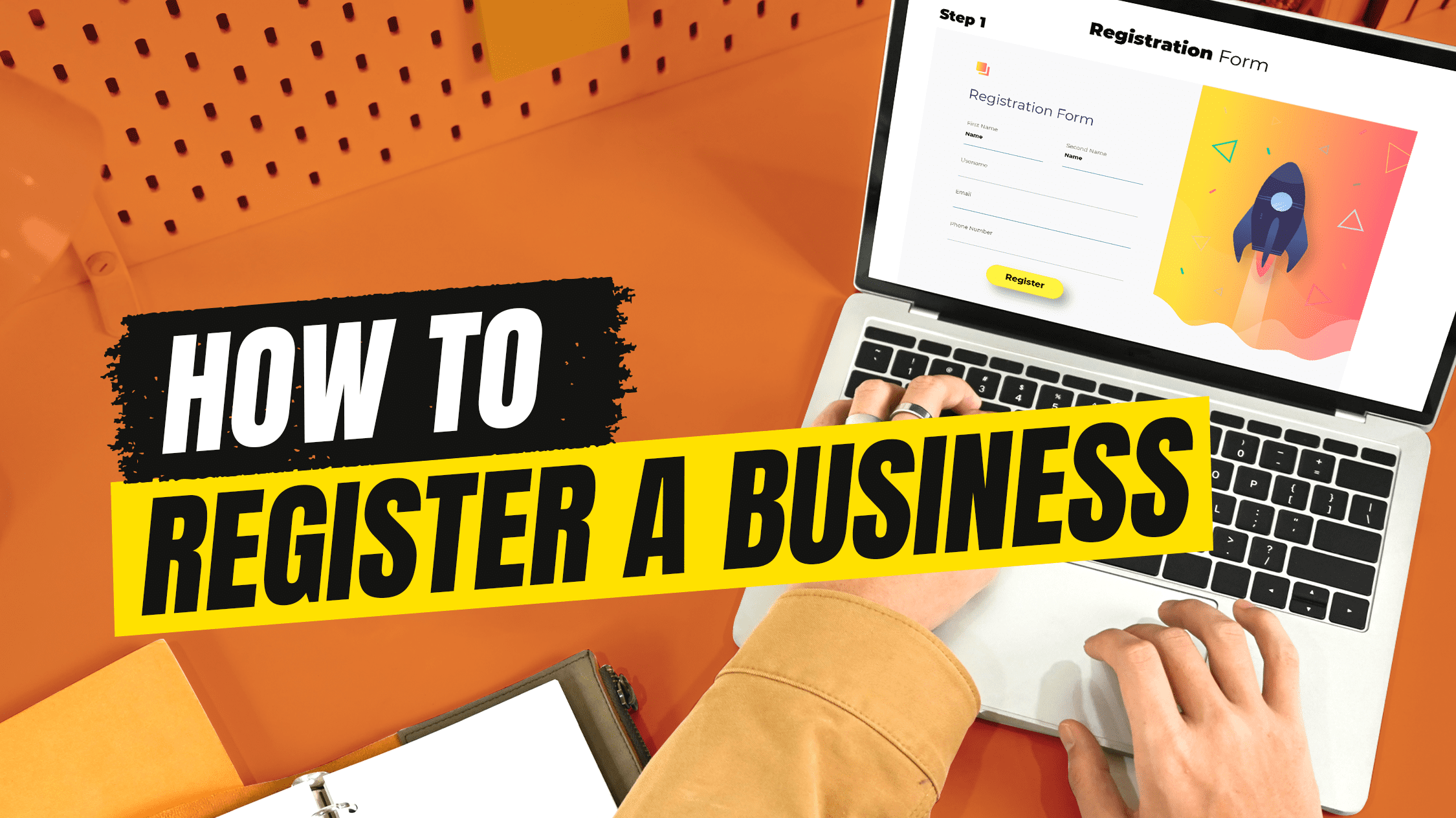One of the most challenging aspects of starting a business is the step or small business registration. It involves multiple local, state, and federal organizations to register a company, but UpFlip is here to make it easy to understand how to register as a small business.
We walk you through the steps to verify a business name, choose a business structure, how to register a small business as a limited liability company, and how to register your business with the IRS to get an EIN.
Before we begin, I think it’s important to discuss the Small Business Administration.
Small Business Administration
The Small Business Administration office is the best place to go to get a good introduction to your county or city governments’ requirements for business licensing. When we were living in Texas, my significant other was able to have them help her with the formation of her business without charging extra.
They offered an in-person class that went through the specific requirement for registering separate entities, the business’s legal requirements that would need to be met, and what local government websites or offices to use. She found it much easier than when we created businesses in other locations.
In addition, they will often offer classes to help make you a better business person. If you are starting your first business, I would strongly recommend going to talk with them first. Alternatively, you can check out our guide on how to get started.
Let’s get into researching if the legal business name is available.
Step 1. Verify the business entity name is available
The first step to register as a small business is to verify the business name is available. You’ll perform this step of registering a business name online with your state’s business license search.
The picture below is for Washington’s business license search, but you can find where to search your state’s business licenses by searching “my state’s business license verification.”
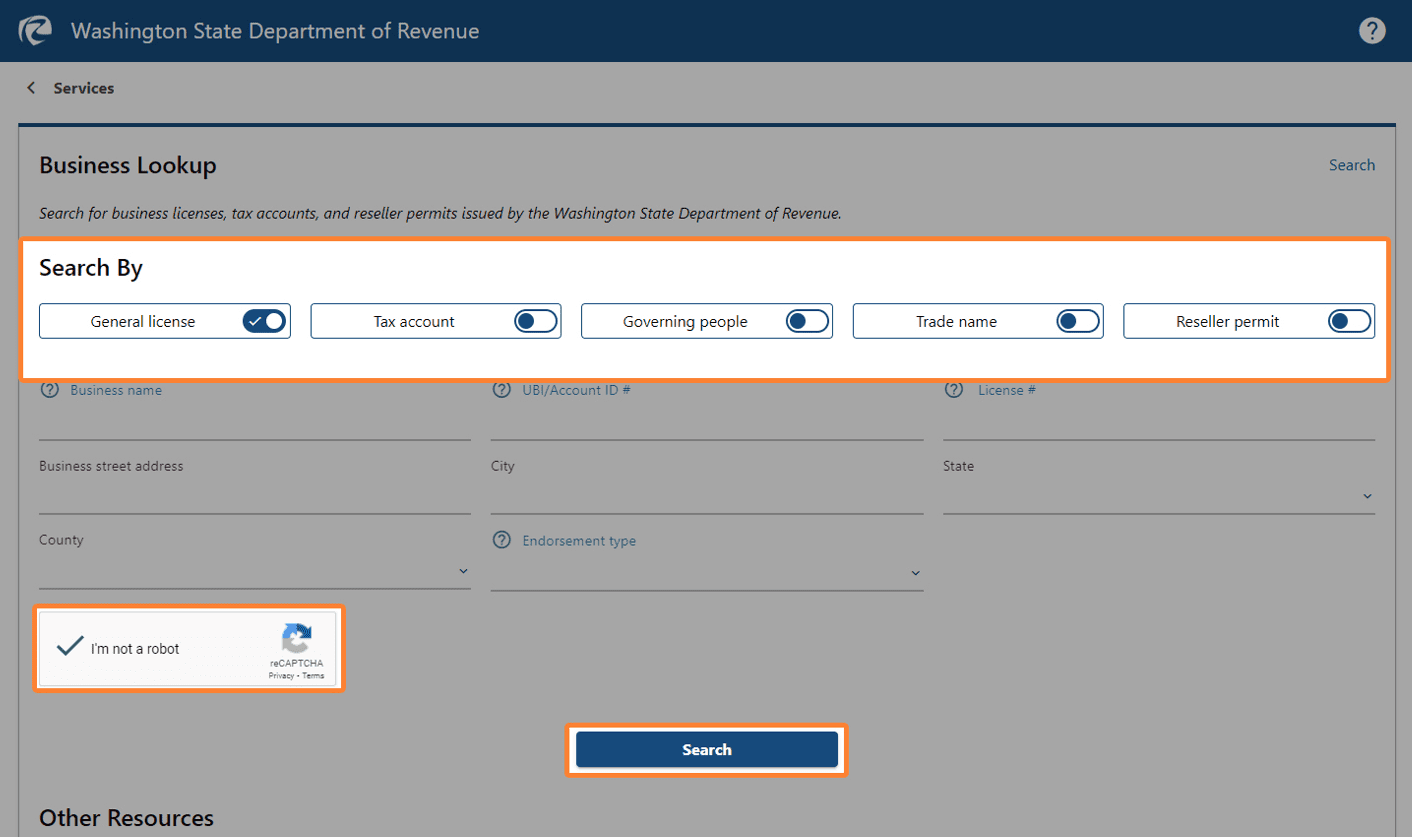
Most states will let you search registered small business names by related topics including:
- Business name
- License number
- Address
- The principal or Registered Agent
- Tax ID
- Reseller Permit
For this scenario, you just want to use the business name. Put in the company name. I used the name “Super Awesome Clothes,” verified that “I am human” and pushed the search button. This confirmed that the name is available in Washington. See the screenshot above.

You also want to check domain availability on Name Cheap. In the picture above, SuperAwesomeClothes.com is available for $1,800 a year, which seems outrageous to me. The price is that high because someone wants to make a profit from it.
I could buy SuperAwesomeClothes.clothing for $3.48 per year which is reasonable. That sounds like an awkward domain to remember so I checked to see if SuperAwesome.clothing is available for the same price. It is so we’ll buy it and go back to register the business with the state.

Step 2. Choose the business structure
The most common business structures are limited liability companies, limited liability partnerships, corporations, sole proprietorships, and partnerships. Choosing which one you want is fairly simple. Ask yourself these questions to decide which will work best?
- Do I want to protect my personal assets?
- If a single owner does not want to protect personal assets, go with a sole proprietorship.
- If there is more than one owner, go with a partnership.
- If you want to protect personal assets, then the next question to ask is do I want to sell stock?
- If yes, go with a corporation.
- If not, go with an LLC or limited liability partnership.
Every type of business entity, except for sole proprietorships and general partnerships, is considered a separate legal entity, which means:
- Business liabilities are separate from personal liability.
- Business assets are separate from personal assets.
Most business structures allow pass-through income, meaning the business income counts as personal income, but a C-Corp has to pay taxes on income separately from personal income.
A limited liability corporation can choose whether they want to adopt the corporate tax code, but the default business structure is as a pass-through entity, meaning their owners only have to pay federal tax with their personal income.
Step 3. How to register a business
Registering a business will be slightly different for each type of business, but to help you best understand how to set up a business, we are going to use a limited liability company to walk you through the registration requirements.
The process will normally involve several state agencies and federal government agencies. The most common agencies you will have to interact with during the business registration process include:
- Secretary of State Offices for each of the states you plan to have a physical presence in
- Internal Revenue Service (IRS) for getting an Employee Identification Number
- United States Patent and Trademark Office (USPTO) for trademark protection
- Local agencies or city governments, which can normally be found on the Secretary of State Office while you register your business structure
- The appropriate state agency to approve a seller’s permit
If you’re wondering how to register a business name for free, there aren’t many options. When I was researching how to register my business name in 2017, I found Nevada allows sole proprietorships to register for free, but it is under the person’s name.
If a prospective business wants a fictitious business name, commonly referred to as DBA (Doing Business As), it will cost extra. Some states include it in the costs to obtain business licenses or business structures, but some will also charge for it separately.
Creating the business structure for a Limited Liability Company
This section will walk you through how to start a limited liability company in the State of Washington. There will be some notes throughout regarding other types of business structures and different states because it is hard to create a one-size-fits-all blog for 50 states plus Washington DC. We’ll be adding more state specific blogs in the future.
Sign up for an account on your state’s website
Depending on the state, you may need to register for an account with the website before beginning. That was the case in our example using Washington to register a limited liability company.
The next step in the business registration process is to sign up for an account with the appropriate Secretary of State Office. Here is Washington’s SOS, but you can find others on USA.gov.
It takes approximately five minutes to set up, requires verifying email, and then takes you to a page that looks something like the picture below once you can sign in.
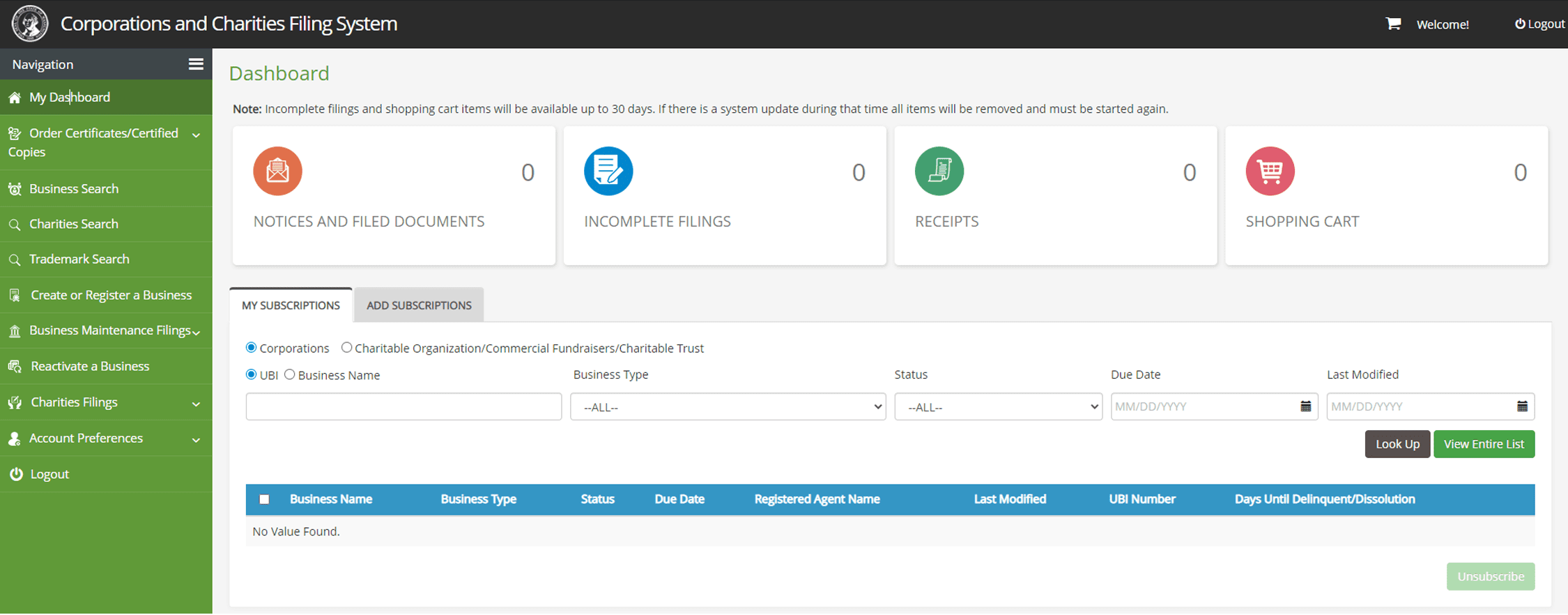
How to register my business
We want to register your business, so we’ll choose that option, which is the 6th option on the left-side menu. This takes you to a page that asks if you are going to be a Washington-based business owner or one from another state or country.
Because most business owners using this guide will conduct business in their home state, we’ll register as a Washington business for this example. After you make that decision, it will ask you to choose from 11 business structure options, which you can see in the picture below. If you aren’t sure which to choose, read our article about how to choose a business structure.
For this example, we’re going to choose a WA Limited Liability Company and defer the initial report for 120 days.
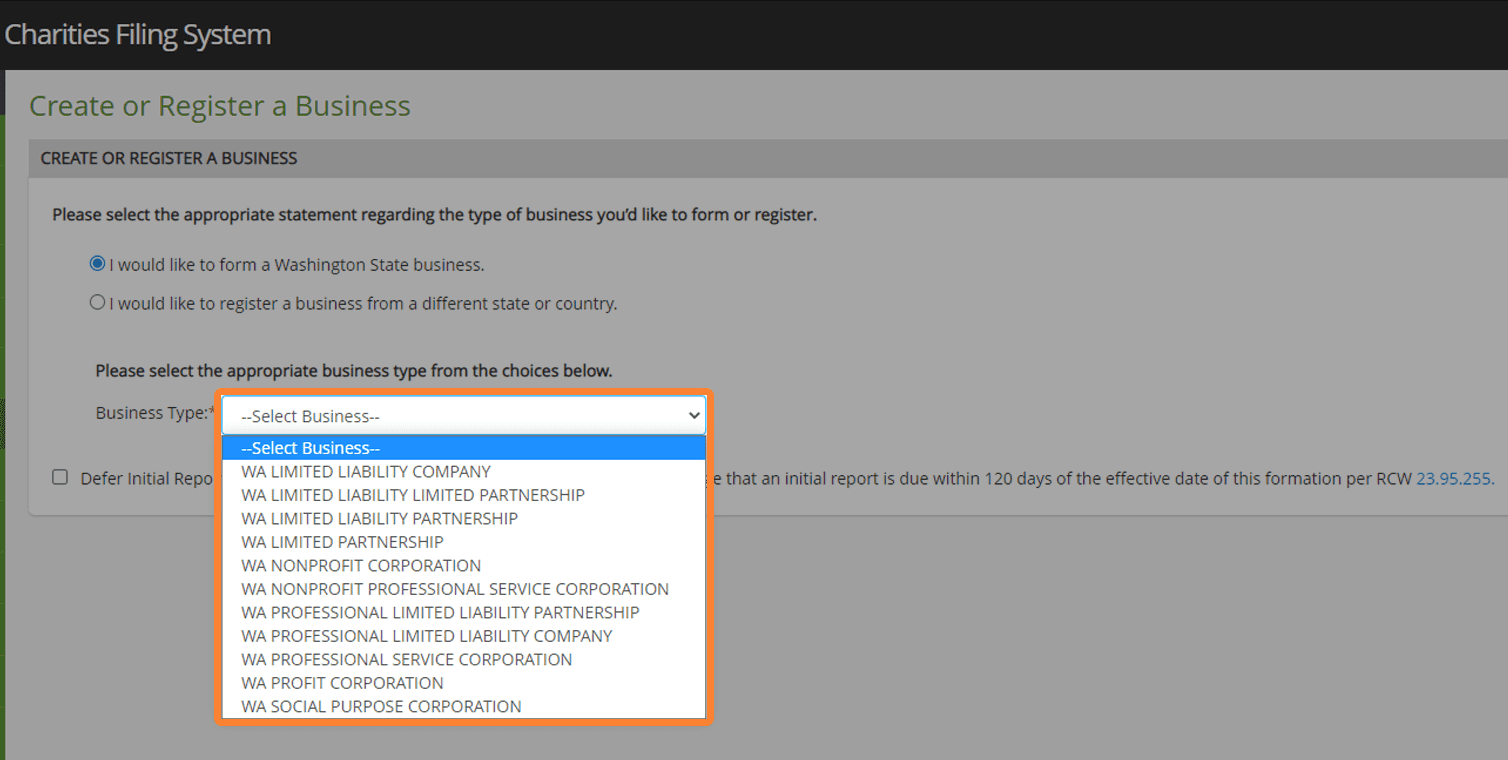
Application to Register a Business Name as an LLC
The following questions will be asked when registering a business in the application:
- Do you already have a UBI number, which is a Unified Business Identifier to help the state track businesses across government agencies?
-
-
- Another state may have something similar.
- We do not.
-
- Have you already reserved the name?
-
-
- I did not, I added “Super Awesome Clothes” and it tells me it’s available.
-
- Who is the registered agent?
-
-
- Gives the option of self or other
- If you are in the state, you can be the registered agent, which I am doing for the purpose of this example. If you are not in the state you will need a registered agent.
- What is their address?
-
- What is the address of the primary place of business?
- Do you want to upload a certificate of formation?
-
- You will have to do this to register your business name.
- For those wondering “how do I register my business as a corporation,” you’ll need the Articles of Incorporation.
- How long will this company be a legal entity?
- Choose perpetual unless it is for a set duration.
- When is the effective date?
- Choose the date you want the business to become a legal entity.
- I chose the date I am writing this.
- Executor–You can use yourself.
- Opt-in for emails.
- Add documents.
- Include the signature of the authorized person (you).
After you add all the information to the page, it gives you a chance to review it on the next page. Then to check out. You’ll want to check out, which in this example would be $200.
Once you have paid, it will be two days, according to this site, for the business structure to be approved or request more information. Once the business structure is approved you will have a UBI that you can use to get:
- Reseller’s license
- Local business licenses
- DBA (if you need small business registration as a partnership or a sole proprietorship)
Then you’ll need to get an employer identification number.
Step 4. Get an Employer Identification Number
Before we begin, it is important that you have everything prepared before you start this step.
The application has to be done in one sitting.
It cannot be saved. The IRS says you need to understand the following items before you register your business:
- If your business structure includes applying for tax-exempt status, it needs to be fully approved before applying here.
- Fifteen minutes of inactivity will end the application for the Employer Identification Number.
- The person applying must have one of the following forms of valid taxpayer identification number:
- Social Security Number-All citizens should have one.
- Individual Taxpayer Identification Number (ITIN) – Used for people who need to file taxes, but cannot obtain a Social Security Number. If you think you might need one, apply for an SSN first. These are the categories of people who normally need an ITIN:
- Nonresident alien who is required to file a U.S. tax return
- U.S. resident alien who is (based on days present in the United States) filing a U.S. tax return
- Dependent or spouse of a U.S. citizen or resident alien
- Dependent or spouse of a nonresident alien visa holder
- Nonresident alien claiming a tax treaty benefit
- Nonresident alien student, professor, or researcher filing a U.S. tax return or claiming an exception
- Employer Identification Number – If you already have a business and this will be a subsidiary, you can use your previous EIN.
If you need more than one EIN for companies controlled by the same person, it will take multiple days due to the one EIN per day per person limit.
You can start the EIN application on the IRS website. Once you click the “apply now” button, you’ll be directed to the screen below. Remember to read and accept the conditions. Then continue.
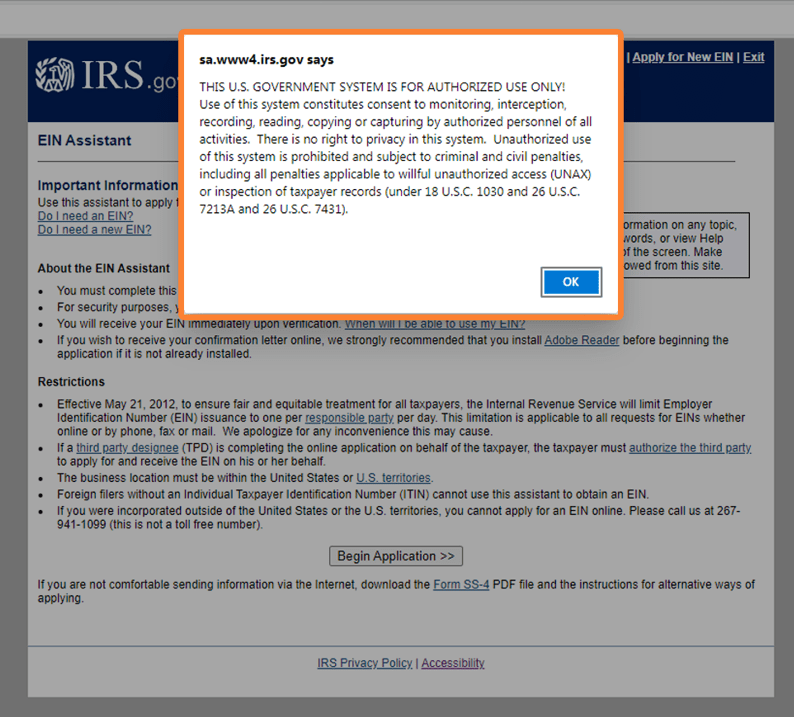
The first question that the system will ask is about the business structure. I chose LLC because it is the most common, other than a sole proprietorship.
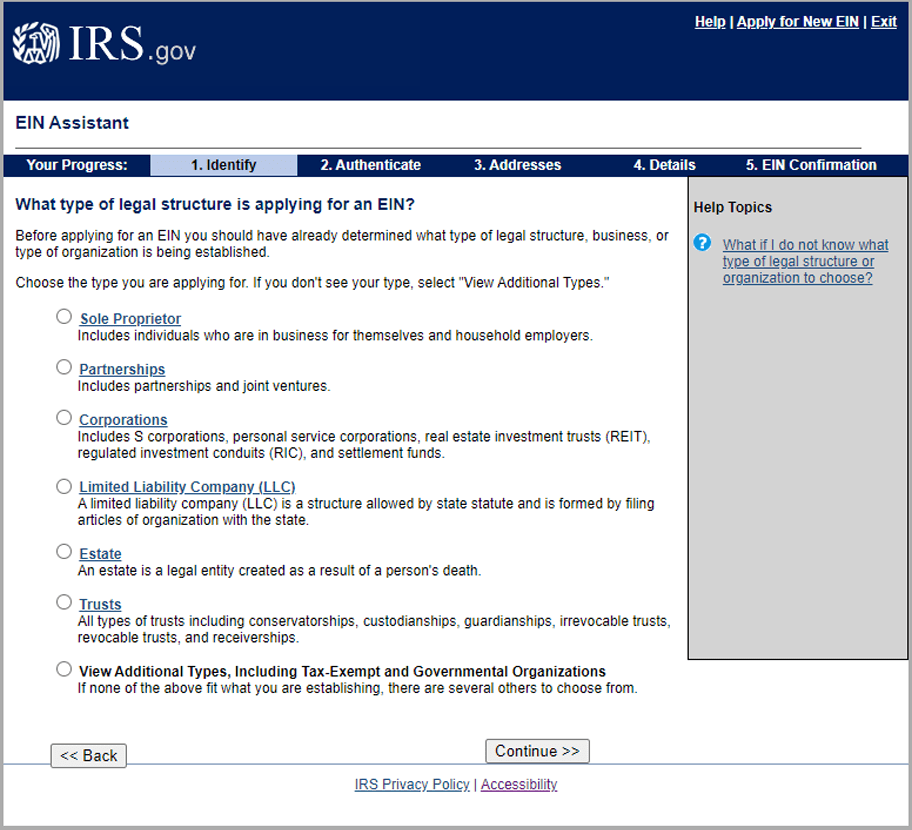
Then, it gives you some information about an LLC.
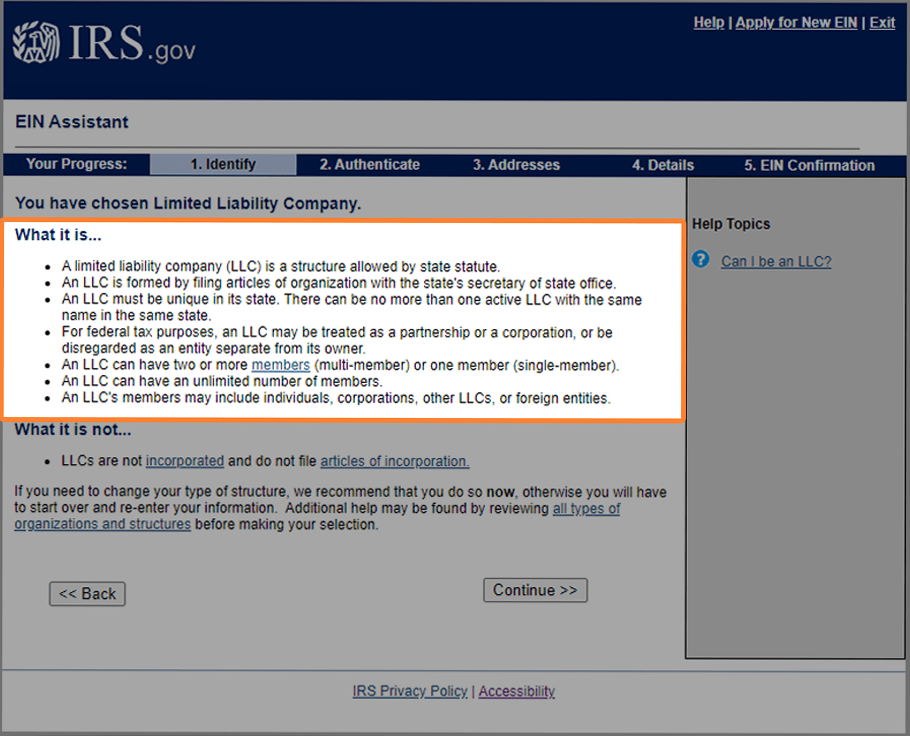
On the next page it will ask:
- How many members are in the LLC?
- What state is the business in?
Answer them, and it will provide some information about the business structure. In this example, I used one member and it informs us that we can not be a partnership, but that we can file a Form 8832 to be taxed as a C-Corp or Form 2553 to be taxed as an S-Corp. I have provided links to both forms.
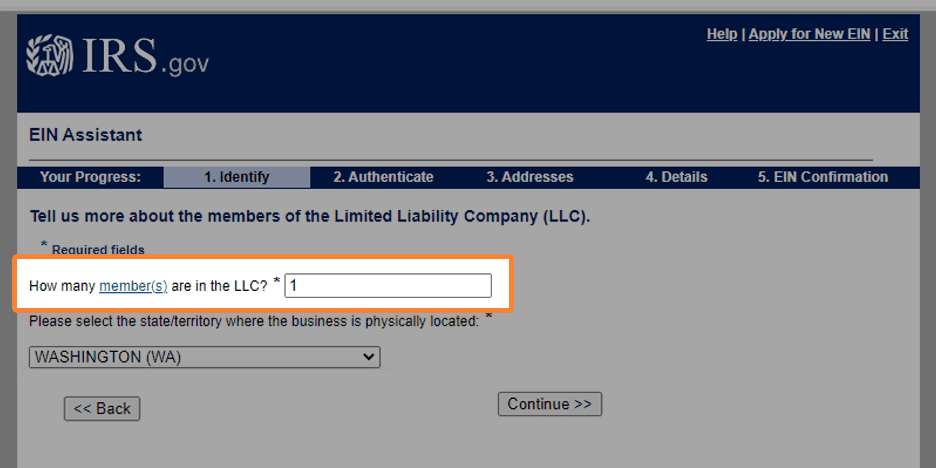
Then, the system will ask why you need an EIN.

Next, it will ask for your name, SSN, or ITIN of one of the owners, or a third party. Input the information.
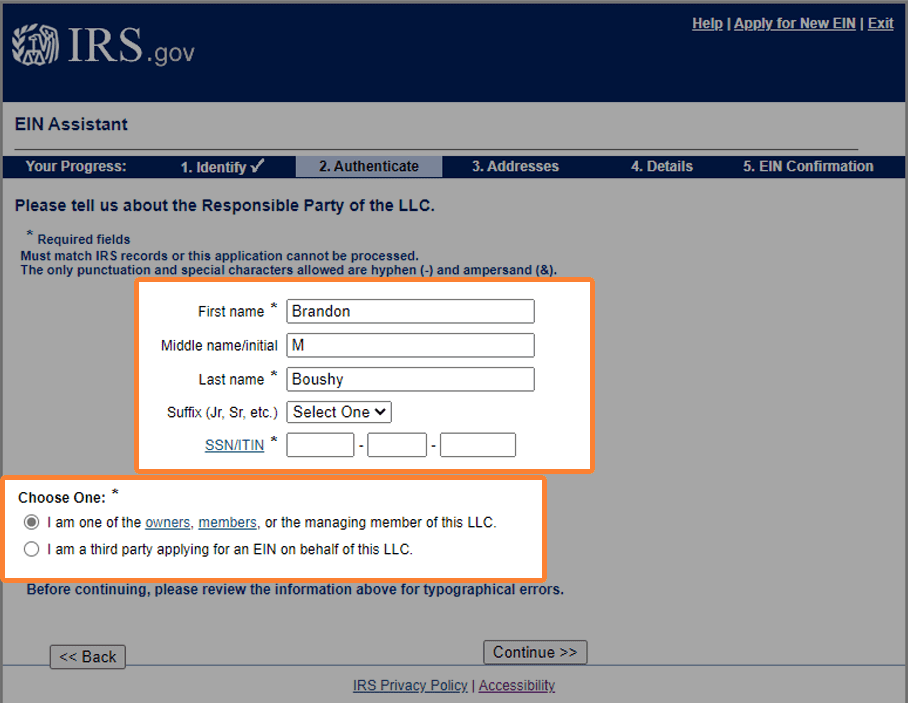
Then, it will ask for the address of the LLC and if you want the mail to be sent to a different address. Input the information based on your LLC.

Then it will ask about the LLC name, and where it is located. Answer them.

On the next page it will ask the following questions:
- Does your business own a motor vehicle with a taxable gross weight of 55,000 pounds or more?
- Does your business involve gambling or wagering?
- Does your business need to file Form 720 (Quarterly Federal Excise Tax Return)?
- Does your business sell or manufacture alcohol, tobacco, or firearms?
- Do you have, or do you expect to have, any employees in the next 12 months that will require W-2?
Under most scenarios, I would expect the answers to be “no” except for the last question. If you are engaged in those fields, there will be other requirements, which you can find by searching: “IRS special requirements for businesses that involve (gambling, vehicles over 55,000 pounds, alcohol, tobacco, firearms)”.
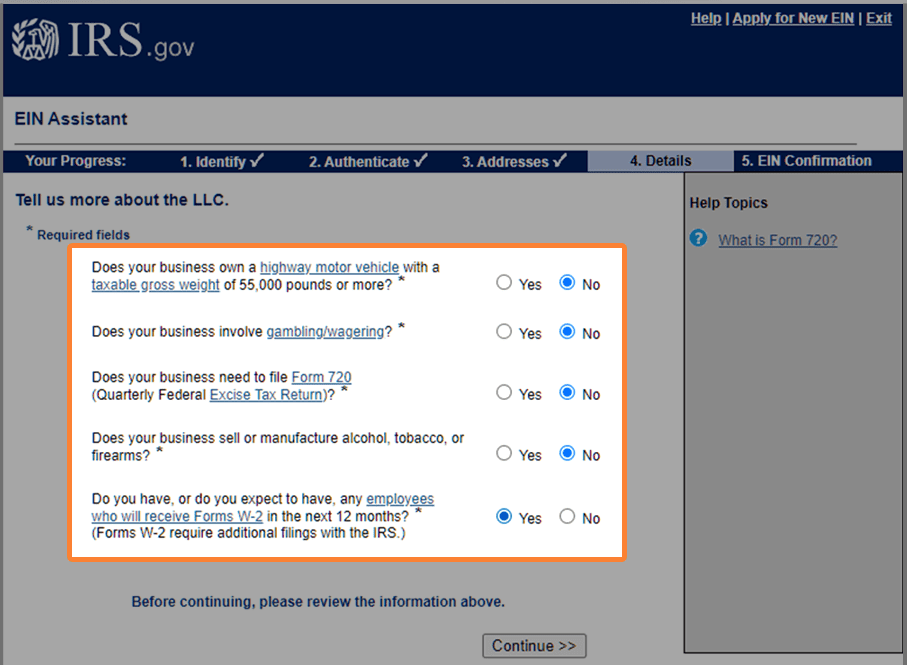
Each one you select will have a page like the one below that I marked for the number of employees Super Awesome Clothes LLC will have in the next year.
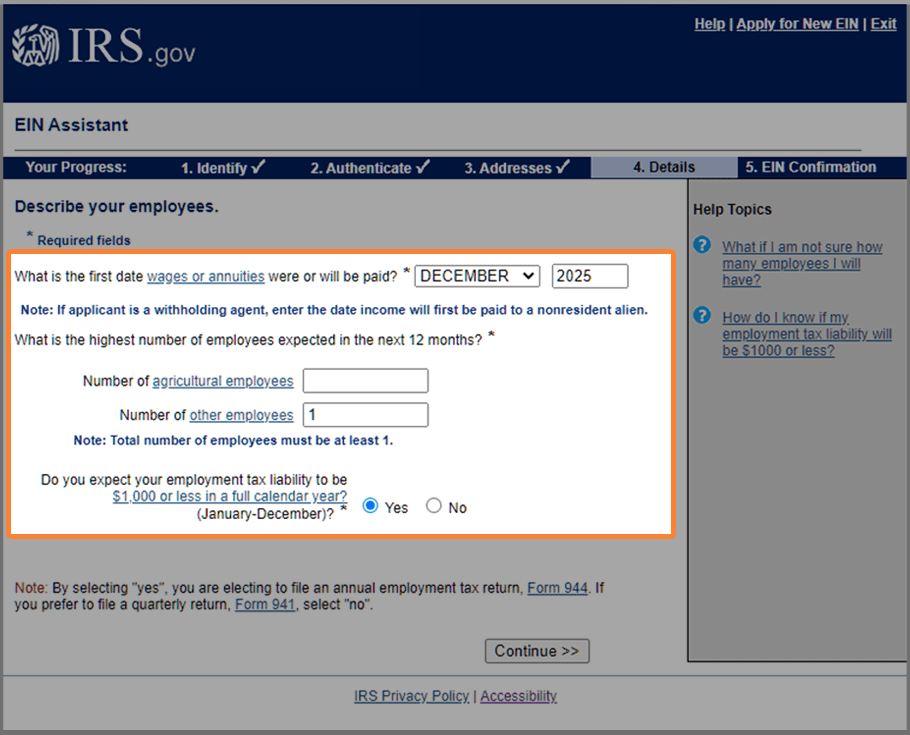
Then, the system asks “What does your business or organization do?” Depending on your answers, the pages after this one will change. I chose retail, then clicked next.
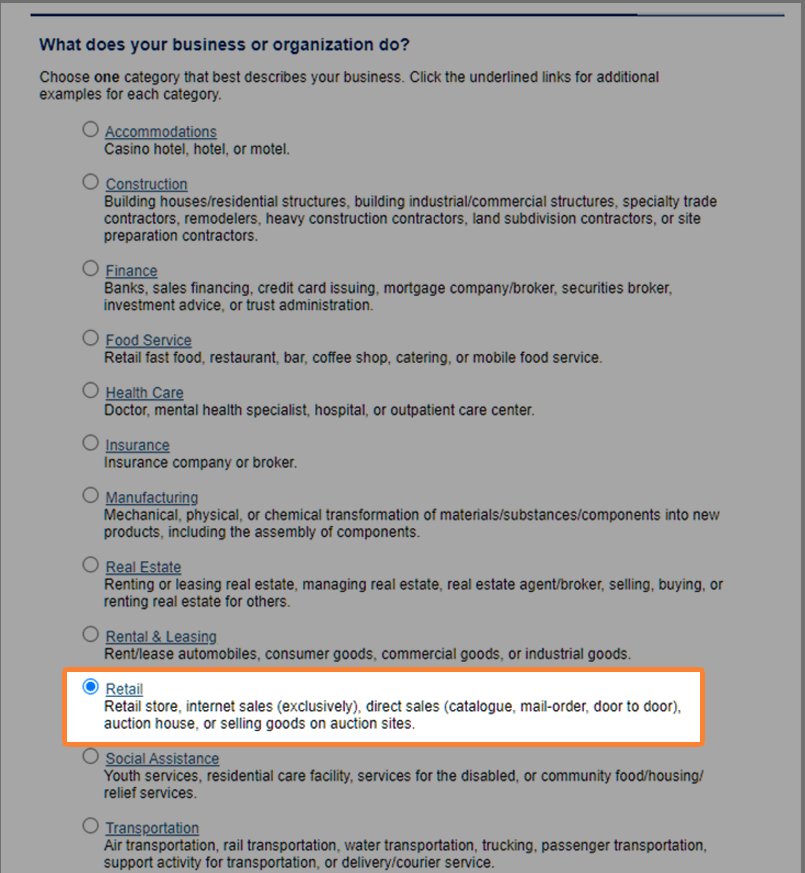
The next step is for you to answer what type of retail, online, storefront, auction house, direct sales, or other. If you will be doing more than one under the same business name select “other “and list the ones the business will engage in.
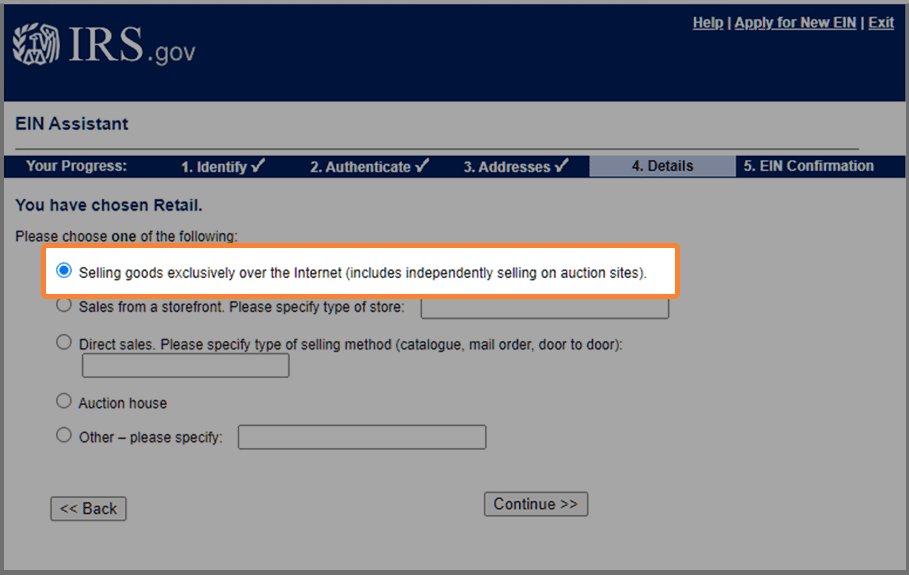
At this point, you will choose how you want them to provide the EIN. You can choose electronically or by mail. Whichever you choose, the next step is important.
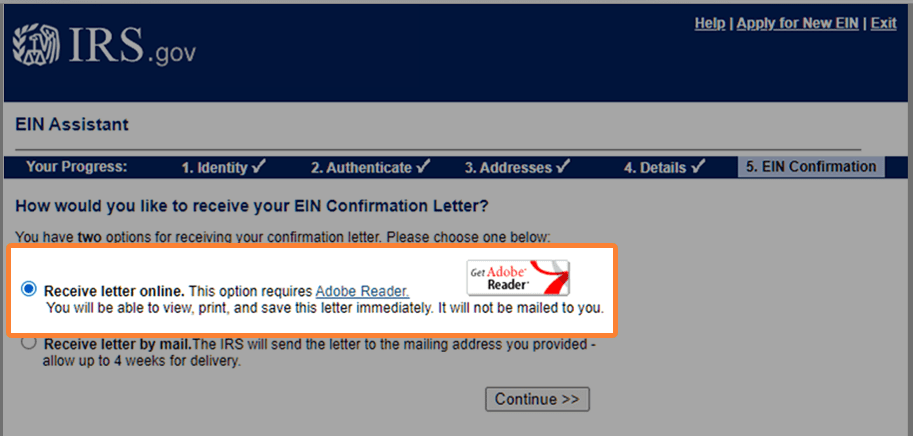
After you complete the previous steps, the system will give you an opportunity to review the information. If everything is correct, click submit and the system will provide your EIN.
Step 5. Save your documents somewhere safe
When you get documents from each of the agencies, it is important to print them out and save both a physical and electronic copy. I would suggest posting the legal documents in a frame on the wall in your business because some are required to be publicly viewable. I would also suggest saving them in a cloud platform like Google Drive.
Wrapping it up
Now you know how to register an online company or brick-and-mortar store. Don’t forget to buy business cards! Check out our business card reviews.
The process for where to register a business name has never been easier because your state’s office probably upgraded their systems because of the pandemic.
If you need to register a new business and have difficulty locating your local requirements after using the site USA.gov, ask our preferred partner, Better Legal to help. They help set up small businesses as LLCs and C-Corps all day long and offer $30 off to UpFlip readers when they need to register a new business.
As we produce more content, we plan to start doing more state-specific blogs based on the results of our analytics software and readers’ requests. If you went through the process as you were reading this article, what state are you registering your business in? Did you find the process easy or difficult?

